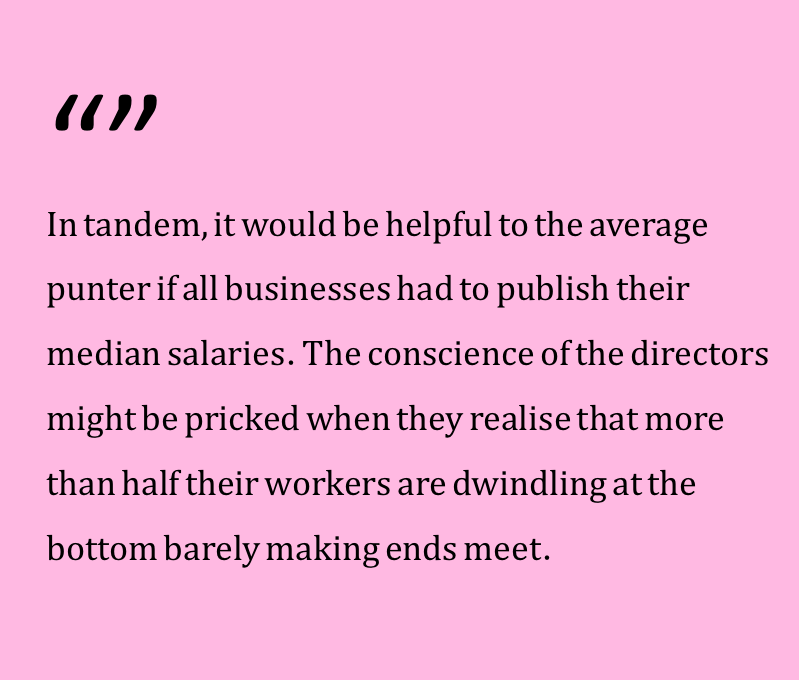|
The middle ground
In the civil service in Ireland there are 22 stated pay grades, from secretary general grade I at €190,233 to a cleaner starting at €37,769. This info was gleaned from https://mywage.org/ireland/salary/public-sector-salary/civil-service-salary-scales-2017 (My guess is the ‘cleaner’ is actually a company of cleaners contracting a service as opposed to a single person.) Now, if all these grades are lined up in increasing order of pay, the 11th pay grade, the one in the middle or the median, is a ‘higher executive officer’ earning €56,415 (after six years good service). What about the median salaries in the private sector? Take the example of a big employer relying on large quantities of human capital. These kinds of employers will always have far more people working at the bottom than at the top. So, lining up all those 1.3 million Amazon workers across the world, — with Jeff Bezos at the top with his $1.3bn net wealth and the tens of thousands of basic workers in the fulfilment centres at the bottom — my guess is the median Amazon worker will be close to the most basic level of €12.50 per hour. Because this is capitalism Huge supermarket chains will have a similar story needing high numbers of checkout and shelf-filling staff to keep the show on the road and dividends flowing to directors and shareholders. So, given that our elected politicians are in charge of the whole thing — would it not be fair if they were paid an average of the median salary in the public service and the median salary in the private sector? In tandem, it would be helpful to the average punter if all businesses had to publish their median salaries. The conscience of the directors might be pricked when they realise that more than half their workers are dwindling at the bottom barely making ends meet. And if you are in that group at the bottom, a knowledge of the median salary offered by your employer might politicise you towards setting up a union or joining a political party to get a better rate of pay and conditions. Another bonus for society would be the legal requirement for every company board to allocate one position to a representative of the lowest paid workers in the company. Solutions to the inequity One solution to these fundamental problems of inequity is obvious: taxing corporate profits above €500,000 at a higher rate, for example, 30%, to provide the money to pay for the handsome salaries being maintained in the public sector. What’s left over then pays for maintaining and developing public infrastructure, social housing, greening the economy, living wages, hospitals, schools, policing…. etc. etc. The list goes on and on and on. Corporation tax at the low rate of 12.5% in Ireland is bluntly applied across profits in the whole private sector. Imagine how unfair it would be if income tax was applied uniformly, at the single rate of 12.5%, no matter what you earned, €24,000 or €2 million. A caveat: what must to be understood by the public sector is that it can't exist without a private sector generating wealth; wealth which is taxed and redistributed to pay for it (the public sector). Meanwhile, the private sector can, of course, exist without a public sector — but it is the wild west — no regulation or safety nets — and only the strong will survive. #fairness #taxation #public #private #wealth First posted 27 September 2022 |
AuthorAlison Hackett — Director and founder of 21st Century Renaissance; author of The Visual Time Traveller 500 Years of History, Art and Science in 100 Unique Designs Archives
February 2023
Categories |
ReviewsThe Visual Time Traveller
This is a labour of love, insanity, beauty and, perhaps, an attempt to reintegrate history, art and science together again. Simon Cocking Irish Tech News Crabbing Her range of language is both staccato and soft, in succinct verse, which encourages you to read this aloud, truly the best way to engage in the emotional depth of a poem. Deirdre Conroy Sunday Independent Poetic Licence in a Time of Corona Your poems tell us all we need to know Ryan Tubridy, RTE Radio podcast |
CONTACTNOT RETAIL
21st Century Renaissance The Glasshouse Harbour Court, George's Place Dun Laoghaire, A96 R8CT Co. Dublin, Ireland E [email protected] VAT number 3761911TH |
© Twenty-First Century Renaissance Ltd 2022 Associate member of Publishing Ireland; Member of Independent Publisher's Guild All rights reserved


 RSS Feed
RSS Feed